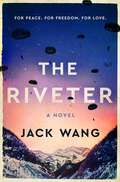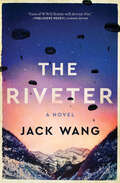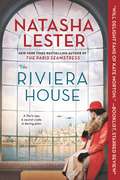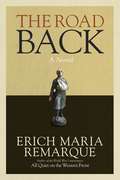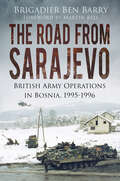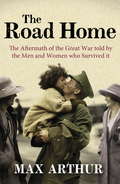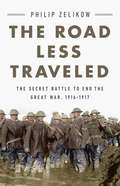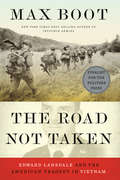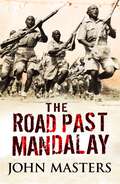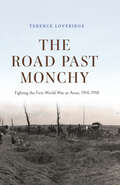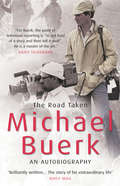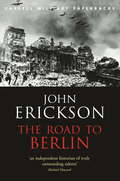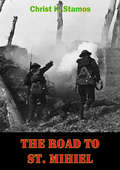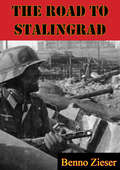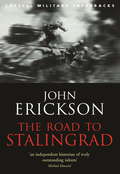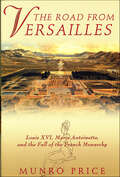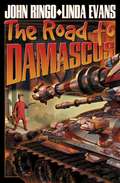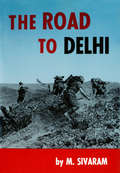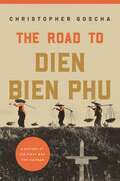- Table View
- List View
The Riveter: A Novel
by Jack WangIn the vein of All the Light We Cannot See, a cross-cultural love story set against the dramatic backdrop of the Allied invasion of Europe during WWII.Vancouver, 1942. Josiah Chang arrives in the bustling city ready to make a new life for himself. The Second World War is in full swing, and Josiah, like so many Canadians, wants to prove his loyalty by serving his country. But Chinese Canadians are barred from joining the army out of fear they might expect citizenship in return. So, Josiah heads to the shipyard where he finds work as a riveter, fastening together the ribs and steel plates of Victory ships. One night, Josiah spots Poppy singing at a navy club. Despite their different backgrounds, they fall for each other instantly, and soon Josiah is spending his nights at Poppy’s small wartime house. Their starry-eyed romance lasts until Poppy’s father comes to visit and the harsh reality of their situation is made clear. Determined to prove himself to Poppy, her parents, and the world, Josiah travels to Toronto where he’s finally given the chance to enlist. Josiah rises to the occasion, but is the world changing as fast as his dreams… From the critically acclaimed author of We Two Alone, Jack Wang’s gorgeous debut novel explores what one man must sacrifice to belong in the only home he has ever truly known.
The Riveter: A Novel
by Jack WangA cross-cultural love story set against the dramatic backdrop of the Allied invasion of Europe in WWII. Vancouver, 1942. Josiah Chang arrives in the bustling city ready to serve his country in the war against fascism, but Chinese Canadians are barred from joining the army out of fear they might expect citizenship in return. So, Josiah heads to the shipyard to find work as a riveter, fastening together the ribs and steel plates of Victory ships. One night, Josiah spots Poppy singing at a navy club. Despite their different backgrounds, they fall for each other instantly and begin a starry-eyed romance that lasts until the harsh reality of their situation is made clear. Determined to prove himself, Josiah takes a train to Toronto where he’s finally given the chance to enlist. After volunteering for the 1st Canadian Parachute Battalion and jumping into Normandy on D-Day, he must fight through the battlefields of Europe to make it back to the woman he loves. By turns harrowing and exhilarating, The Riveter explores what one man must sacrifice to belong to the only country he has ever called home.
The Riviera House
by Natasha LesterA lush and engrossing novel of one woman&’s quest to keep Nazis from stealing priceless art during WWII, perfect for fans of The Rose Code. Paris, 1939: The Nazis think Éliane can't understand German. They&’re wrong. They think she&’s merely cataloging art in the Louvre and unaware they&’re stealing national treasures for their private collections. They have no idea she&’s carefully decoding their notes and smuggling information to the Resistance. But Éliane is playing a dangerous game. Does she dare trust the man she once loved with her secrets, or will he only betray her once again? She has no way to know for certain . . . until a trip to a stunning home on the French Riviera brings a whole new level of peril. Present Day: Wanting to forget the tragedy that has left her life in shambles, Remy Lang heads to a home she&’s mysteriously inherited on the Riviera. While working on her vintage fashion business, she discovers a catalog of the artworks stolen during World War II and is shocked to see a painting that hung on her childhood bedroom wall. Who is her family, really? And does the Riviera house hold more secrets than Remy is ready to face?CNN Underscored: Most Anticipated New Books to Read this August
The Riviera House: a breathtaking and escapist historical romance set on the French Riviera - the perfect summer read
by Natasha LesterThe brand-new escapist summer read from the internationally bestselling author of The Paris Secret!ONE UNFORGETTABLE SUMMER WILL UNLOCK A DECADES-OLD SECRET . . .'A meticulously researched novel with a perfectly woven dual timeline . . . I think The Riviera House is her best book yet' KATHRYN HUGHES, bestselling author of The LetterFRENCH RIVIERA, PRESENT DAYWhen Remy discovers she's mysteriously inherited a house on the French Riviera, she drops everything to go there, desperately seeking answers. There, she's shocked to uncover a catalogue of the artwork known to have been stolen by the Nazis during WWII, but there's something oddly familiar about one of the paintings . . .PARIS, 1939While working at the Louvre, bold and beautiful Eliane falls for talented painter Xavier. But when the Nazis occupy the city, Xavier leaves Eliane behind for the safety of England. Heartbroken, she throws herself into helping the resistance catalogue the priceless treasures the Nazis are stealing. But Eliane is playing a dangerous game, and soon realises she may have put her trust in the wrong person . . .As Remy questions everything she thought she knew about her family, in the past Eliane finds herself in real peril. Could it be that the Riviera house holds more secrets than either Remy or Eliane are ready to face?Set between war-torn Paris and the present day, The Riviera House is a breathtakingly beautiful story of love and sacrifice, from the internationally bestselling author of The Paris Secret. Perfect for fans of Rachel Hore, Lucinda Riley and Tracy Rees.
The Riviera House: a breathtaking and escapist love story set on the French Riviera - the perfect summer read
by Natasha LesterThe brand-new escapist summer romance from the internationally bestselling author of The Paris Secret!ONE UNFORGETTABLE SUMMER WILL UNLOCK A DECADES-OLD SECRET . . . When Remy discovers she's mysteriously inherited a house on the French Riviera, she drops everything to go there, desperately seeking answers and an escape from her broken heart. There, she's shocked to find a catalogue of the artwork known to have been stolen during WWII and is even more surprised when she recognises one as the painting that hung in her childhood bedroom. In Paris, 1939, while working at the Louvre, bold and beautiful Eliane falls for talented painter Xavier. But when the Nazis occupy the city, Xavier leaves for England, leaving Eliane behind. Heartbroken, she throws herself into helping the resistance catalogue the priceless treasures the Nazis are stealing. But Eliane is playing a dangerous game, and after a trip to a stunning home on the French Riviera, she realises she may have put her trust in the wrong person . . . As Remy questions everything she thought she knew about her family, Eliane finds herself in real peril. Could it be that the Riviera house holds more secrets than either Remy or Eliane are ready to face? Set between war-torn Paris and the present day, The Riviera House is a breathtakingly beautiful story of love and sacrifice. Perfect for fans of Rachel Hore, Lucinda Riley and Tracy ReesPRAISE FOR NATASHA LESTER:'A meticulously researched novel about the lengths people will go to protect one another, and a love that lasts a lifetime . . . an extraordinary book' MARIE CLAIRE'Divine' GILL PAUL, bestselling author of The Secret Wife'An emotional and sweeping tale' CHANEL CLEETON, bestselling author of Next Year in Havana 'A splendid, breathtaking novel, full of mystery and passion...a must read!' JEANNE MACKIN, author of The Last Collection
The Road Back: A Novel (All Quiet on the Western Front #2)
by Erich Maria Remarque Arthur Wesley WheenThe sequel to the masterpiece All Quiet on the Western Front, The Road Back is a classic novel of the slow return of peace to Europe in the years following World War I.After four grueling years, the Great War has finally ended. Now Ernst and the few men left from his company cannot help wondering what will become of them. The town they departed as eager young men seems colder, their homes smaller, the reasons their comrades had to die even more inexplicable.For Ernst and his friends, the road back to peace is more treacherous than they ever imagined. Suffering food shortages, political unrest, and a broken heart, Ernst undergoes a crisis that teaches him what there is to live for--and what he has that no one can ever take away."The world has a great writer in Erich Maria Remarque. He is a craftsman of unquestionably first rank, a man who can bend language to his will. Whether he writes of men or of inanimate nature, his touch is sensitive, firm, and sure."--The New York Times Book Review
The Road From Sarajevo: British Army Operations in Bosnia, 1995-1996
by Martin Bell Ben BarryIn 1992 Bosnia descended into a savage and bitter civil war, which by 1995 had claimed over a quarter of a million lives. Following the Dayton Peace Agreement between the warring Bosnian Serbs, Muslims and Croats, NATO began its first land operation, taking over from the UN Protection Force. With a total of only 200 men, a British battlegroup was charged to enforce the peace in a 100km area, through which wound a front line separating the territory of the Bosnian Muslims from that of the Bosnian Serb forces. In this updated edition of the acclaimed book A Cold War, Brigadier Ben Barry has produced the definitive account of the British Army’s dangerous and groundbreaking operations in Bosnia.
The Road Home: The Aftermath Of The Great War Told By The Men And Women Who Survived It
by Max Arthur11am, 11.11.1918: the war is finally over. After four long years Britain welcomed her heroes home. Wives and mothers were reunited with loved ones they'd feared they'd never see again. Fathers met sons and daughters born during the war years for the very first time. It was a time of great joy - but it was also a time of enormous change. The soldiers and nurses who survived life at the Front faced the reality of rebuilding their lives in a society that had changed beyond recognition. How did the veterans readjust to civilian life? How did they cope with their war wounds, work and memories of lost comrades? And what of the people they returned to - the independent young women who were asked to give up the work they had been enjoying, the wives who had to readjust to life with men who seemed like strangers?
The Road Home: The Aftermath of the Great War Told by the Men and Women Who Survived It
by Max ArthurHow the men and women of Britain found 'the road home' after the Great War. From the SUNDAY TIMES bestselling author of THE LOST POST.11am, 11.11.1918: the war is finally over. After four long years Britain welcomed her heroes home. Wives and mothers were reunited with loved ones they'd feared they'd never see again. Fathers met sons and daughters born during the war years for the very first time. It was a time of great joy - but it was also a time of enormous change. The soldiers and nurses who survived life at the Front faced the reality of rebuilding their lives in a society that had changed beyond recognition. How did the veterans readjust to civilian life? How did they cope with their war wounds, work and memories of lost comrades? And what of the people they returned to - the independent young women who were asked to give up the work they had been enjoying, the wives who had to readjust to life with men who seemed like strangers?
The Road Less Traveled: The Secret Battle to End the Great War, 1916-1917
by Philip ZelikowDuring a pivotal few months in the middle of the First World War all sides-Germany, Britain, and America-believed the war could be concluded. Peace at the end of 1916 would have saved millions of lives and changed the course of history utterly. Two years into the most terrible conflict the world had ever known, the warring powers faced a crisis. There were no good military options. Money, men, and supplies were running short on all sides. The German chancellor secretly sought President Woodrow Wilson's mediation to end the war, just as British ministers and France's president also concluded that the time was right. The Road Less Traveled describes how tantalizingly close these far-sighted statesmen came to ending the war, saving millions of lives, and avoiding the total war that dimmed hopes for a better world. Theirs was a secret battle that is only now becoming fully understood, a story of civic courage, awful responsibility, and how some leaders rose to the occasion while others shrank from it or chased other ambitions. "Peace is on the floor waiting to be picked up!" pleaded the German ambassador to the United States. This book explains both the strategies and fumbles of people facing a great crossroads of history. The Road Less Traveled reveals one of the last great mysteries of the Great War: that it simply never should have lasted so long or cost so much.
The Road Not Taken: Edward Lansdale And The American Tragedy In Vietnam
by Max BootA NEW YORK TIMES BESTSELLER In chronicling the adventurous life of legendary CIA operative Edward Lansdale, The Road Not Taken definitively reframes our understanding of the Vietnam War. In this epic biography of Edward Lansdale (1908– 1987), the man said to be the fictional model for Graham Greene’s The Quiet American, best-selling historian Max Boot demonstrates how Lansdale pioneered a “hearts and mind” diplomacy, first in the Philippines, then in Vietnam. It was a visionary policy that, as Boot reveals, was ultimately crushed by America’s giant military bureaucracy, steered by elitist generals and blueblood diplomats who favored troop build-ups and napalm bombs over winning the trust of the people. Through dozens of interviews and access to neverbefore-seen documents—including long-hidden love letters—Boot recasts this cautionary American story, tracing the bold rise and the crashing fall of the roguish “T. E. Lawrence of Asia” from the battle of Dien Bien Phu to the humiliating American evacuation in 1975. Bringing a tragic complexity to this so-called “ugly American,” this “engrossing biography” (Karl Marlantes) rescues Lansdale from historical ignominy and suggests that Vietnam could have been different had we only listened. With reverberations that continue to play out in Iraq and Afghanistan, The Road Not Taken is a biography of profound historical consequence.
The Road Past Mandalay (W&N Military)
by John MastersThe second part of the bestselling novelist's dramatic autobiography about his time in the Gurkhas during the second world warThis is the second part of John Masters' autobiography: how he fought with his Gurkha regiment during World War II until his promotion to command one of the Chindit columns behind enemy lines in Burma. Written by a bestselling novelist at the height of his powers, it is an exceptionally moving story that culminates in him having to personally shoot a number of wounded British soldiers who cannot be evacuated before their position is overrun by the Japanese. It is an uncomfortable reminder that Churchill's obsession with 'special forces' squandered thousands of Allied lives in operations that owed more to public relations than strategic calculation. This military and moral odyssey is one of the greatest of World War II frontline memoirs.
The Road Past Monchy: Fighting the First World War at Arras, 1914–1918
by Terence LoveridgeTerence Loveridge offers a unique look at the land and air operations around the strategic village of Monchy-le-Preux at the center of the western front during World War I. The story of the Great War is usually one of condemnation or rehabilitation of strategists and consecration of the common soldier, while the story of those who planned, directed, and led operations on the ground has generally been overlooked.Loveridge uses experiences of junior leaders fighting around the key terrain of Monchy-le-Preux to challenge the currently accepted views and reveal that the Great War, despite subsequent impression, was a surprisingly dynamic effort conducted in an arena of constantly evolving practices, techniques, and technology. Less well known than its contemporary campaigns at the Somme, Verdun, or Passchendaele, Monchy also carries less preconceived baggage and thus offers a prime opportunity to reevaluate the accepted wisdom of the events, personalities, and understandings of the Great War.The Road Past Monchy offers readers a unique chance to uncover the "lost" perspective of junior war leaders in a theater of war that saw almost continuous operations from 1914 through to 1918.
The Road Taken
by Michael Buerk'Dawn, and as the sun breaks through the piercing chill of night on the plain outside Korem it lights up a biblical famine, now, in the Twentieth Century.'Those words opened Michael Buerk's first report on the Ethiopian famine for the 6 o'clock news on October 24th 1984. His reports sent shock waves round the world. The Live Aid concert, a direct consequence of Bob Geldof watching that broadcast, was watched by half the planet.Michael Buerk has reported on some of the biggest stories in our lifetime: the Flixborough chemical plant fire, the Birmingham pub bombing, Lockerbie. He was in Buenos Aires at the start of the Falklands War; he reported the death throes of apartheid in South Africa. He was the face of the BBC flagship evening news for many years and has fronted everything from the popular BBC1 series 999 to the erudite Radio 4 programme The Moral Maze. He has won every major award and is universally admired and respected for his intelligent and honest journalism.Here, he also reveals the private Michael Buerk, his bigamist father, his long and happy marriage to Christine and his delight at fatherhood.
The Road To Berlin: Continuing The History Of Stalin's War With Germany
by John EricksonBeginning with the destruction of the German Sixth Army at Stalingrad, The Road to Berlin is the story of how the Red Army drove the Germans from its territory, and finally invaded the Reich. Using an enormous range of primary sources - Soviet, German and Eastern European - John Erickson describes fighting and hardship on a scale almost unimaginable in the West. He provides a detailed narrative of all the battles on all the fronts, and also of the Soviet system of war which achieved, under maximum stress, near-impossible feats in the field and in the factories. The book also tells of the diplomatic moves and counter-moves, including the all-important conferences at Tehran and Yalta. Comprehensive, compelling and immensely readable, it is an indispensable book for any student of the Second World War.
The Road To Berlin: Continuing The History Of Stalin's War With Germany
by Prof John EricksonBeginning with the destruction of the German Sixth Army at Stalingrad, The Road to Berlin is the story of how the Red Army drove the Germans from its territory, and finally invaded the Reich. Using an enormous range of primary sources - Soviet, German and Eastern European - John Erickson describes fighting and hardship on a scale almost unimaginable in the West. He provides a detailed narrative of all the battles on all the fronts, and also of the Soviet system of war which achieved, under maximum stress, near-impossible feats in the field and in the factories. The book also tells of the diplomatic moves and counter-moves, including the all-important conferences at Tehran and Yalta. Comprehensive, compelling and immensely readable, it is an indispensable book for any student of the Second World War.
The Road To St. Mihiel [Illustrated Edition]
by Christ K. StamasIncludes The Americans in the First World War Illustration Pack – 57 photos/illustrations and 10 mapsIN THE ROAD TO ST. MIHIEL, Christ Stamas takes “the road back” and with a retrospective eye views his personal experiences in “No Man’s land” during the cataclysmic years of World War I.
The Road To Stalingrad
by Alec Brown Benno ZieserSTALINGRAD...an eyewitness report of World War II’s most decisive battle.Drafted into the German infantry when he was scarcely out of school, Benno Zieser fought his way deep into Soviet Russia—advancing, retreating, digging in, destroying tanks with hand grenades, battling snipers, killing the enemy in hand-to-hand combat.Outnumbered and outmaneuvered, he and his platoon struggled on, till their bravery was no longer an act of patriotism but a desperate effort to survive. Few of them did. At Stalingrad, the Wehrmacht soldiers reached the end of the line: nothing could spring the giant trap set by Russian crack troops closing in on them.Zieser’s account of the war’s most brutal battle is intensely moving and honest—a personal ordeal with a universal meaning.On the last day of January, 1943, the German Sixth Army surrendered to the Russians at Stalingrad. After a winter campaign of unparalleled horror and hardship, the Wehrmacht was beaten.THE ROAD TO STALINGRAD is a shattering eyewitness account of that lost battle—written by a survivor. Benno Zieser was drafted at the age of nineteen and fought in the infantry at Stalingrad. In this book he tells of his first naive enthusiasm—then the shocking realities:The frozen wastes of an unconquerable continent...gutted roads strewn with abandoned equipment...the anonymous graves by the wayside...the colossal fraud behind Hitler’s promise of victory.Not since All QUIET ON THE WESTERN FRONT has a German author written such a powerful indictment of war—but Benno Zieser’s book is fact, not fiction.
The Road To Stalingrad: Stalin's War With Germany (W&N Military)
by Prof John EricksonIn The Road to Stalingrad, Professor Erickson takes us in detail from the inept command structures and strategic delusions of the pre-invasion Soviet Union, through the humiliations as her armies fell back on all fronts before the Barbarossa onslaught, until the tide turned at last at Stalingrad. Unsparingly, he assesses the generals and political leaders and analyses the confusions and wranglings within both Allied and Axis commands. The climax, the grinding battle for Stalingrad, leaves the Red Army poised for its majestic counter-offensive, Operation 'Uranus', discovering it had 'caught a tiger by the tail'.
The Road from Versailles: Louis XVI, Marie Antoinette, and the Fall of the French Monarchy
by Munro Price“Through brilliant detective work, Price has uncovered documents that shed a definitive light on the French Crown's policy toward the revolution.” —Library JournalIn acclaimed historian Munro Price's powerful new book, he confronts one of the enduring mysteries of the French Revolution—what were the true actions and feelings of Louis XVI and Marie Antoinette as they watched their sovereignty collapse?Dragged back from Versailles to Paris by the crowd in October 1789, the king and queen became prisoners in the capital. They were compelled for their own safety to approve the Revolution and its agenda. Yet, in deep secrecy, they soon began to develop a very different, and dangerous, strategy. The precautions they took against discovery, and the bloody overthrow of the monarchy three years later, dispersed or obliterated most of the clues to their real policy. Much of this evidence has until now remained unknown.The Road from Versailles reconstructs in detail, for the first time, the king and queen's clandestine diplomacy from 1789 until their executions. To do so, it focuses on a vital but previously ignored figure, the royal couple's confidant, the baron de Breteuil. Exiled from France by the Revolution, Breteuil became their secret prime minister, and confidential emissary to the courts of Europe.Along with the queen's probable lover, the comte de Fersen, it was Breteuil who organized the royal family's dramatic dash for freedom, the flight to Varennes. Breteuil's role is crucial to an understanding of what Louis and Marie Antoinette secretly felt and thought during the Revolution. To unlock these secrets, The Road from Versailles draws on highly important unpublished and previously unknown material.
The Road to Damascus
by Linda Evans John RingoWhen a ruthless political regime seizes power on a world struggling to recover from alien invasion, a former war hero finds herself leading a desperate band of freedom fighters.
The Road to Delhi
by M. SivaramAlthough the peaceful struggles of Mahatma Gandhi are well known in the West, the armed resistance of many Indians during World War II is far less understood; this epic drama ads an important layer to the history of India and the British Empire. The east Asian battlefronts serve as the backgrounds for this story of the attempt by patriotic Indians to drive the British out of their Motherland and gain independence; of the fanatic ambition to attain this goal by the man who chose to be called "Nataji" (the leader), Subhas Chandra Bose; and of the Indian Independence League, ingratiating themselves to the Japanese to further their end while the Japanese happily appeared to reciprocate to gain the Indians' support against the British.The action and drama that filled this battle within the larger scale war is vividly told in this first person narrative by one who remembers what it feels like to have closely escaped death and is grateful to be alive to tell about it. Author Sivaram, who enjoyed the confidence of Netaji Bose and was appointed by him to several positions of responsibility during the Free India campaign, is uniquely qualified to tell this stirring tale.
The Road to Delhi
by M. SivaramAlthough the peaceful struggles of Mahatma Gandhi are well known in the West, the armed resistance of many Indians during World War II is far less understood; this epic drama ads an important layer to the history of India and the British Empire. The east Asian battlefronts serve as the backgrounds for this story of the attempt by patriotic Indians to drive the British out of their Motherland and gain independence; of the fanatic ambition to attain this goal by the man who chose to be called "Nataji" (the leader), Subhas Chandra Bose; and of the Indian Independence League, ingratiating themselves to the Japanese to further their end while the Japanese happily appeared to reciprocate to gain the Indians' support against the British.The action and drama that filled this battle within the larger scale war is vividly told in this first person narrative by one who remembers what it feels like to have closely escaped death and is grateful to be alive to tell about it. Author Sivaram, who enjoyed the confidence of Netaji Bose and was appointed by him to several positions of responsibility during the Free India campaign, is uniquely qualified to tell this stirring tale.
The Road to Delhi
by M. SivaramAlthough the peaceful struggles of Mahatma Gandhi are well known in the West, the armed resistance of many Indians during World War II is far less understood; this epic drama ads an important layer to the history of India and the British Empire. The east Asian battlefronts serve as the backgrounds for this story of the attempt by patriotic Indians to drive the British out of their Motherland and gain independence; of the fanatic ambition to attain this goal by the man who chose to be called "Nataji" (the leader), Subhas Chandra Bose; and of the Indian Independence League, ingratiating themselves to the Japanese to further their end while the Japanese happily appeared to reciprocate to gain the Indians' support against the British.The action and drama that filled this battle within the larger scale war is vividly told in this first person narrative by one who remembers what it feels like to have closely escaped death and is grateful to be alive to tell about it. Author Sivaram, who enjoyed the confidence of Netaji Bose and was appointed by him to several positions of responsibility during the Free India campaign, is uniquely qualified to tell this stirring tale.
The Road to Dien Bien Phu: A History of the First War for Vietnam
by Christopher GoschaA multifaceted history of Ho Chi Minh’s climactic victory over French colonial might that foreshadowed America’s experience in VietnamOn May 7, 1954, when the bullets stopped and the air stilled in Dien Bien Phu, there was no doubt that Vietnam could fight a mighty colonial power and win. After nearly a decade of struggle, a nation forged in the crucible of war had achieved a victory undreamed of by any other national liberation movement. The Road to Dien Bien Phu tells the story of how Ho Chi Minh turned a ragtag guerrilla army into a modern fighting force capable of bringing down the formidable French army.Taking readers from the outbreak of fighting in 1945 to the epic battle at Dien Bien Phu, Christopher Goscha shows how Ho transformed Vietnam from a decentralized guerrilla state based in the countryside to a single-party communist state shaped by a specific form of “War Communism.” Goscha discusses how the Vietnamese operated both states through economics, trade, policing, information gathering, and communications technology. He challenges the wisdom of counterinsurgency methods developed by the French and still used by the Americans today, and explains why the First Indochina War was arguably the most brutal war of decolonization in the twentieth century, killing a million Vietnamese, most of them civilians.Panoramic in scope, The Road to Dien Bien Phu transforms our understanding of this conflict and the one the United States would later enter, and sheds new light on communist warfare and statecraft in East Asia today.
